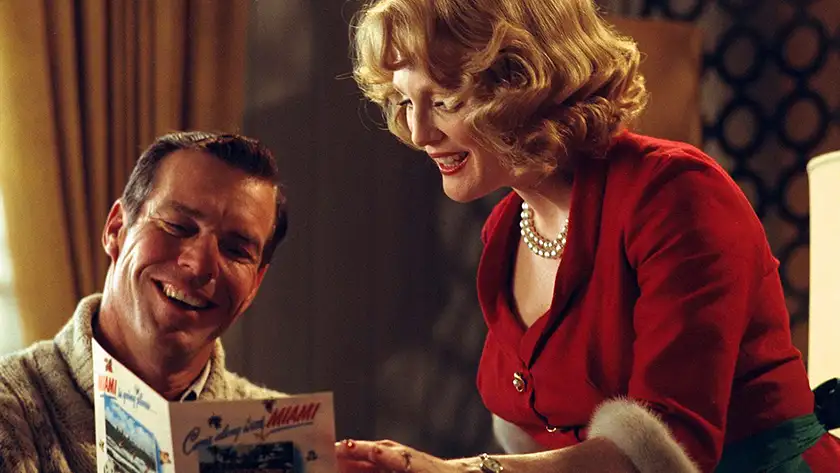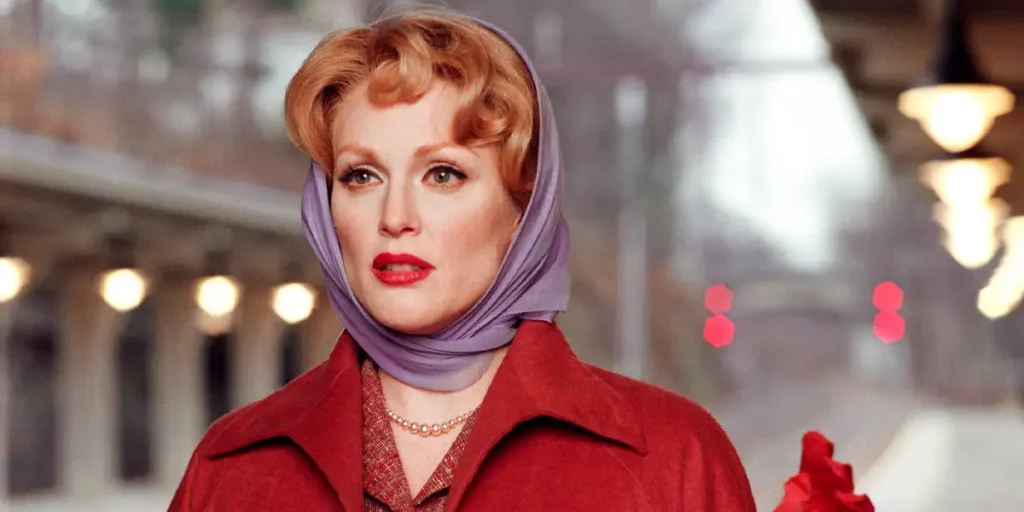Todd Haynes’ Far From Heaven is a sumptuous homage to the movies of Douglas Sirk that is elevated beyond pastiche by its gripping emotional center.
In Todd Haynes’ homage to the melodramas of the 1950s Far From Heaven, Cathy Whitaker (Julianne Moore, of Safe) has done everything that society has deemed laudatory, and followed all of their unspoken rules correctly. A housewife residing in the suburb of Hartford, Connecticut in 1957, Cathy wears pearls and an A-line dress in order to do the grocery shopping and supervise the gardening. The color of Cathy’s clothing never clashes with the decor of her surroundings. As she drives through Hartford, the autumn scenery is so vivid and picturesque that it could not exist in the real world. Cathy is married to adman Frank Whitaker (Dennis Quaid) and they have an idyllic Leave it to Beaver/ Life with Father life: a beautiful home with all of the latest amenities, a young boy and a young girl, and a housekeeper. In fact, Frank and Cathy’s life is so ideal that they are used by his firm in advertisements, billed as “Mr. and Mrs. Magnatech.”
Something as seemingly ordered and perfect as the image of Cathy’s life cannot exist in reality. The story of Far From Heaven concerns Cathy’s growing awareness of the artificiality of her doll house life. Like many of Haynes’ other work – such as Superstar, Safe, Velvet Goldmine, and May December – Far From Heaven slowly chisels away at the performance in search of the truth of the person underneath.
Julianne Moore’s performance is a truly remarkable piece of screen acting; her inherent warmth and vitality do a great deal of work in helping Far From Heaven to not just feel like a dollhouse. When we first meet Cathy, she is a superficial housewife, meticulously conforming to rules of society. Moore plays this with a broad, almost parodic artificiality, almost daring the viewer to judge Cathy and laugh at her. As the movie progresses, Moore opens up, and quietly, tenderly, shows us Cathy’s inner world. By the time the credits run, Cathy has turned into a human of flesh and bone, one for whom the viewer can imagine what happens next.

Due to her standing in the community, Cathy is interviewed by the society page of Hartford’s paper. In the middle of the interview, Cathy spots a Black man (Dennis Haysbert) walking through her garden. Alarmed, she goes out to politely encourage him to move along. She discovers that it is Raymond Deagen, the son of the Whitakers’ former gardener. Raymond is a well-spoken and intelligent widower, devoted to his 11-year old daughter, who has taken over his father’s business after his death. A tentative connection forms between Cathy and Raymond, one that very likely would have developed into a romance if society would have accepted one between people of two different colors in 1957.
At the same time, Frank Whitaker is undergoing his own transformation. He is a former college player type: wide-smiling, good-natured, and All-American. Yet, there is quickly a sense that Frank is chafing under the pressure of a performance. We watch as he nervously, furtively glancing over his shoulders, enters a gay bar on the seedy side of Hartford. When Cathy discovers him kissing another man in his office, Frank attempts conversion therapy, determined to “lick this thing,” but only begins to drink more heavily. The marriage inevitably crumbles as Frank and Cathy find it harder to conform, with Cathy’s burgeoning relationship with Raymond, and Frank falling in love with a man.
From the lush, plaintive score by Elmer Bernstein to the swooping cinematography by Edward Lachman to the use of such visual techniques as rear projection, the filmmaking of Far From Heaven is in direct conversation with that of Hollywood melodramas of the 1940s and 1950s. More specifically, it is a tribute to the movies of German-born director Douglas Sirk (1900-1987). The color schemes, camera movements, and even plot beats used by Far From Heaven all hearken back to a series of technicolor melodramas Sirk directed for Universal Pictures in the 1950s. The most relevant movies for Far From Heaven are All That Heaven Allows (1955), There’s Always Tomorrow (1956) Written on the Wind (1956) and Imitation of Life (1959). (All of them come highly recommended.) At the time of their initial release, Sirk’s movies were written off as banal women’s pictures, but they were rediscovered in the late 1960s, and appreciated for the biting social criticism underneath the soap opera plotting and heightened stylization.
Far From Heaven is a thought experiment conducted by filmmaker Todd Haynes, a look at what sort of movie Sirk may have made without the constrictions of the Production Code. What was conveyed through inference in Sirk’s movies is telegraphed bluntly to the audience in Far From Heaven. For example, where in Written in the Wind the repressed homosexuality of the character portrayed by Robert Stack was kept to subtext, expressed through sly, coded dialogue, in Far From Heaven Haynes can have Frank tell Cathy directly that he has fallen in love with another man.
There is no subtext in Far From Heaven. This bluntness makes for a less intellectually involving viewing experience for the audience, but Haynes shares Sirk’s ability to touch the heartstrings. The film is a lush three-hanky weepie, so emotionally gripping that some sequences play out with the intensity of a thriller. It fully envelopes the viewer in its vision, helping them to forget about the artificiality and get swept up in the emotions. The most remarkable aspect of the movie is the way that it succeeds both as a style exercise and homage to Douglas Sirk, and on its own terms as an individual piece of filmmaking. One does not have to have seen a movie by Douglas Sirk in order to enjoy Far From Heaven.
Both the melodrama and the 50s have been turned into a parody of themselves by the world’s cultural consciousness; the melodrama, a broad, manipulative piece that only serves to make housewives cry and resembles little of everyday reality, and the 50s, a time of repression, hypocrisy and bigotry. With Far From Heaven, Todd Haynes digs underneath the surface and shows us the honest emotionality of the melodrama genre, and the humanity of the people of the 1950s. Perhaps, Haynes tells us, Old Hollywood movies still have something to tell people in 2002, and even 2024.
Far From Heaven is now available to watch on digital and on demand.
Loud and Clear Reviews has an affiliate partnership with Apple, so we receive a share of the revenue from your purchase or streaming of the films when you click on the button on this page. This won’t affect how much you pay for them and helps us keep the site free for everyone.

